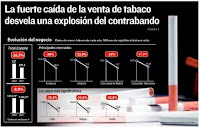SPAIN (Agencies/Graph: Cinco Días) An old Spanish saying: hecha la ley, hecha la trampa (approx. make a law, break a law). Contraband blonde cigarrettes account for 6% of sales overall, and is estimated at 20% in the provinces of Cádiz and Sevilla, always favourite markets for the smugglers. In just two months tobacco smuggling, not long ago in definite decline, has risen to become a serious problem for the Spanish Treasury. False packaging -and their often overly poisonous contents- already account for 5.8% of legal sales throughout the country, according to Altadis, the Spanish arm of Imperial Tobacco, the British giant. Compare that to>
1% for 2010, some 24 million packets. The problem is most acute in three provinces of Andalucía: Cádiz, Sevilla and Málaga. Sales of legal tax-paying brands have dropped by 30% (68 million packs) in January and February in Andalucía as a whole. This autonomous region is the second most important in sales, after Cataluña, and sales have fallen by several points more than in the rest of country, which averages 26.5% (387.3 million packs). And within Andalucía, the three provinces leave their neighbours behind: Sevilla 32.8%, Málaga 33.6% and Cádiz 35.4%
Behind these figures lie several reasons. One is the rise in legal tobacco sales that came at the end of last year, the objective being to bring in €780 million to the national coffers. A price rise here, means more profit for the smugglers, although Gibraltar was quick to hike its own prices at the same time, evidently not to the same level.
Another reason, obviously, was the anti-smoking legislation that was brought in on January 2, which accounts for those giving up smoking altogether - and for a rise in sales of roll-up tobacco.
Headache for the Treasury
These two reasons could become a headache for the Treasury but a fillip for the big, organized smugglers and forgers in Eastern Europe and China, not to mention the small fry that don't get caught at the myriad control points set up all over the place.
As a result, Congress last Thursday approved a new anti-contraband law that ups the value of smuggled tobacco caught from €6,000 to €20,000 for it to be considered a crime, as opposed to a misdemeanor. The Government had originally wanted to put that ceiling up to 30,000 but in the end submitted to pressure from sales outlets and tobaccconists.
There is also a fear that Galicia, in the Northwest, could become a new main port of entry for fake and contraband brands, as it was for many years that for drugs. The Guardia Civil there has had to partly dismantle its Servicio de Vigilancia Aduanera (SIV) units because of cutbacks. In March the SIV came to an agreement with Sea Rescue to use the latter's air and marine facilities for their operations. At the moment the figures for contraband are not as alarming in Galicia as in Andalucía.
Tobacconists and other outlets are looking upon the present situation and fear going back to the 1990s. In 1997, the Treasury lost 16% of its tobacco revenue to contraband, close to €484 millions. This meant some €141.8millions in lost revenue for the then-national fabricators, Tabacalera, predecessors to Altadis.
Fortuna, Marlboro, Winston, favourite legal brands
Despite the fact that at local level it would appear that brands such as American Eagle, Chesterfield and Golden American are favourites, the Spanish 'market' as a whole says that it is the old favourites, Fortuna, Marlboro and Winston that are the most damaged by contraband.
Altadis's leading brand is Fortuna, exclusively Spanish, sales for which have dropped by 35% in the first two months of the year, though it is still the third brand in the nation's preference. Ahead of Fortuna are Marlboro, made under license from the US's Philip Morris, with a sales drop of 30.8% and Winston, owned by Japan Tobacco, which has declined by a more moderate 25.1%.
Calculating how counterfeit brands impact the legal sales of the same brands is a complicated business. But the tobacconist organizations have come up with some figures: an average car can take about five boxes of cigarettes, each one with a value of €2,000 on the black market. So each vehicle can transport €10,000-worth of illegal brands, which when the new regulations mentioned above become law, is not a crime but a misdemeanour.
Spain, Europe's tobacconist
The country has always been considered the supplier of cheap tobacco to its neighbours to the North because prices have been considerably lower. But Spain had bragged about being rid of smuggling and counterfeits on a large scale, an advantage to the Treasury and smokers themselves, given their unknown ingredients.
However, similar upturns to Spain's reflect increases in prices elsewhere in Europe. For instance, from 1994 to 2008 Treasury revenue in the UK went up by 50%, but in the home market of Imperial Tobacco and British American Tobacco, 28% of cigarettes and 72% of roll-up tobacco come from outside the country.
In France, between January 2003 and January 2004 prices went up by an average of one euro per pack. A sales downturn, the French Government admitted, was owed principally to contraband and trans-frontier commerce.


No comments:
Post a Comment